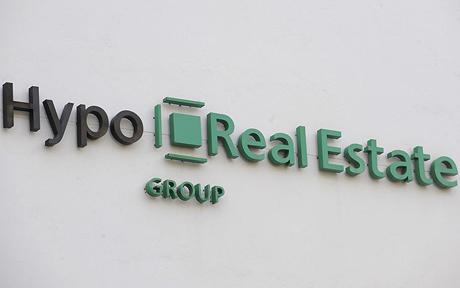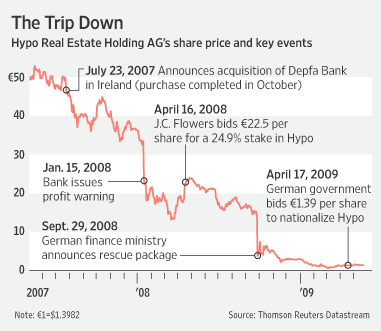
BERLIN — Germany’s financial regulator warned of serious problems at Hypo Real Estate Holding AG six months before the lender was rescued in a massive bailout, but the regulator lacked powers to act and the government ignored its warnings, according to documents viewed by The Wall Street Journal.
The documents — brought to light in preparation for parliamentary committee hearings Thursday to examine the government’s handling of Hypo’s bailout — are likely to prove politically charged ahead of national elections in September.
For months, Germany has lectured the U.S. and others on the need for stricter regulation of financial markets, holding itself up as a model. The German parliament probe into the €102 billion ($142.6 billion) rescue of Munich-based Hypo, however, suggests Germany struggled as much as the U.S. or Britain to control the risks the country’s banks were taking.

Hypo’s funding problems and huge losses on complex securities make it the worst of Germany’s problem banks, though it is one of many. German banks could face total losses in the current financial crisis of €200 billion to €300 billion, according to several estimates, of which only around €100 billion has been written down.
Spokesmen for Hypo and the Deutsche Bundesbank, Germany’s central bank, declined to comment.
Overall, banks in Western Europe could lose about $1.4 trillion in this crisis, more than expected losses in the U.S. banking system, according to the International Monetary Fund.
Finance Minister Peer Steinbrück, who has repeatedly said the “center of gravity” of the global financial crisis lies in the U.S., earlier this month rejected publishing stress tests on German banks, saying it could undermine confidence in the banking system.
A Finance Ministry spokesman said Wednesday that top officials including Mr. Steinbrück were aware of problems in capital and banking markets in 2008, but had no specific indications that Hypo was in difficulty at that time. The failure of Lehman Brothers Holdings Inc. in the U.S. last September was the event that pushed Hypo toward insolvency, the spokesman said.
However, documents produced by the German parliament investigation show that on March 20, 2008 — months before Lehman’s collapse — financial-markets regulator Bafin passed on to the German Finance Ministry a report Bafin had requested from the Bundesbank on Hypo’s funding.
The Bundesbank’s report, which included a special audit of Hypo’s Dublin-based Depfa Bank PLC unit, raised an alarm about Hypo’s massive short-term borrowing needs, as well as its risk management. The report also said that Hypo’s compliance with key banking regulations on managing liquidity and other market risks “must be seen as nonexistent.”
At a hearing earlier this year, Bafin said it was unable to act, according to documents reviewed by the Journal. Like 43 other German banking groups, Hypo has a holding company as a parent, and German law doesn’t allow Bafin to regulate holding companies.
At a July 31 meeting of senior Hypo, Bafin and Bundesbank officials, Bafin asked the Hypo officials to write to the finance ministry to request that Bafin be able to regulate it, according to minutes of the meeting reviewed by the Journal. Bafin, Hypo and the Bundesbank declined to comment.
The Finance Ministry in November told parliament in a letter that an unnamed senior Finance Ministry official to whom the March report on Hypo was addressed never saw it, because he was on vacation. It was reviewed by lower-ranking officials, and when he returned to work, the report had been filed away, the letter said. The Finance Ministry declined to comment.
In September, Hypo needed a massive government bailout because its Depfa unit couldn’t borrow enough funds to meet its obligations. The German Finance Ministry later told parliament the bank had been “able to find short-term financing without difficulty” in the months before the collapse of Lehmans. This was contradicted by the March report, which said that in many cases it was difficult for Depfa to get the funding.
Mr. Steinbrück also said last fall, as the government prepared a rescue package for Hypo, that German regulators had had no way of telling what was going on at Hypo’s Irish unit — apparently unaware that officials had been to Dublin to audit the unit and had sent their findings to his ministry.
A Finance Ministry spokesman said Mr. Steinbrück wasn’t aware of the audit until later. The spokesman added that the Finance Ministry oversees hundreds of financial institutions and must rely on its supporting agencies to handle the details of oversight.
Hypo bought Depfa for €5.7 billion in October 2007. Depfa’s business model involved borrowing short-term funds to invest in complex assets such as U.S. mortgage-based securities. Bafin head Jochen Sanio in March told Germany’s parliament that he had been skeptical about the Depfa acquisition, but lacked the power to stop or supervise the purchase because Hypo was buying a foreign subsidiary. Mr. Sanio, though a spokeswoman, declined to comment.
In April, a month after the Finance Ministry had received the preliminary audit report with its damning verdict on Hypo’s risk management, a group of investors led by U.S. financier J.C. Flowers announced their intention of buying a 24.9% stake in Hypo, which they followed through on.
Those investors now stand to lose most of their investment, as the government plans to fully nationalize Hypo as a fraction of its former value. A spokesman for Mr. Flowers declined to comment.
Write to David Crawford at [email protected] and Marcus Walker at [email protected]
By DAVID CRAWFORD and MARCUS WALKER
May 28, 2009
Source: The Wall Street Journal